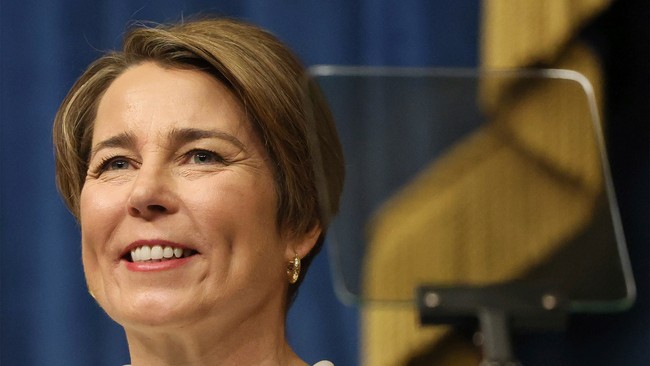🔴 Website 👉 https://u-s-news.com/
Telegram 👉 https://t.me/usnewscom_channel
Massachusetts Governor Maura Healey, who once stood firmly against deportation efforts by President Trump, has changed her stance significantly. She now supports the apprehension of criminals, even if it involves federal immigration enforcement agents operating within the state.
Healey, initially critical of such operations, clarified to reporters that these actions should not be labeled as “raids.” She stated, “What it seems to be is what we expected and what I support, which is the apprehension of criminals in our communities.” This statement marks a notable shift from her earlier position, where she had pledged to use her “executive powers” to prevent deportations.
Healey’s new approach comes amidst a viral video showing an illegal Haitian immigrant with a criminal record expressing his frustration over his arrest in Boston. The video captures him shouting expletives against Trump while praising Biden and Obama for their past support. This incident has brought attention to Healey’s evolving stance, raising questions about her future actions regarding immigrants with less severe criminal histories.
Just two months ago, Healey appeared on MSNBC shortly after Trump’s election victory, where she adamantly opposed any collaboration with federal deportation efforts. When asked if the Massachusetts State Police would assist in mass deportations, she unequivocally answered, “No. Absolutely not.” She emphasized the importance of using every available tool to protect the state’s residents, highlighting her commitment to safeguarding undocumented individuals who had not committed serious crimes.
Gov. Maura Healey on whether the Massachusetts State Police would assist in mass deportations if the Trump admin requests it:
“No. Absolutely not.” pic.twitter.com/NZTLZSJ4g6
— The Post Millennial (@TPostMillennial) November 7, 2024
However, a series of alarming incidents in Massachusetts involving illegal immigrant shelters has prompted Healey to reconsider her position. Reports of serious crimes, including child rape and drug offenses, occurring in these shelters have forced her to take action.
MA Governor Maura Healey does complete 180 and supports Trump’s deportation efforts.
“What it seems to be is what we expected and what I support, which is the apprehension of criminals in our communities.”
Healey promised “executive power” to stop them.https://t.co/yY7048qDXO pic.twitter.com/FUhli6P3gc
— Rusty (@Rusty_Weiss) January 24, 2025
In December, she ordered inspections of these facilities after it was discovered that a Dominican illegal immigrant had been found with an AR-15 and a large stash of drugs. She expressed outrage over individuals who continue to break the law after entering the country illegally.
The shift in Healey’s stance raises questions about whether she had previously been unaware of these issues or if she had chosen to ignore them. As the Trump administration intensifies its efforts to enforce immigration laws, the governor’s prior pledge to resist mass deportations seems increasingly untenable.
Despite her opposition to targeting non-criminal undocumented individuals, the federal government is taking steps to ensure state and local compliance with immigration enforcement.
A memo from acting Deputy Attorney General Emil Bove instructs federal prosecutors to investigate any state or local officials who attempt to hinder deportation efforts. This directive underscores the legal consequences for those obstructing federal immigration operations. The threat of prosecution may have influenced Healey’s decision to align more closely with federal policies, at least in cases involving criminal activity.
Healey’s willingness to support the prosecution of criminals, regardless of their immigration status, suggests a pragmatic approach to law enforcement. However, her acknowledgment that many undocumented immigrants have committed no crimes beyond their illegal entry indicates a continued struggle to balance compassion with legal obligations. As the situation evolves, it remains to be seen whether Healey’s views will further align with federal policy or if she will maintain her stance against broader deportation initiatives.
The evolving dynamics between state and federal authorities on immigration enforcement highlight the complexities of navigating this contentious issue. Healey’s initial resistance to Trump’s deportation agenda stands in stark contrast to her current support for criminal apprehensions. This transformation underscores the challenges faced by state leaders in balancing public safety concerns with the rights of undocumented individuals.
Healey’s future actions will likely be closely monitored as she grapples with the political and social implications of her changing position. Her decisions will have significant ramifications for both the immigrant community and her political standing. As the Trump administration continues to assert its authority on immigration matters, the potential for further clashes with state officials looms large.
The unfolding situation in Massachusetts serves as a microcosm of the broader national debate on immigration enforcement. The tension between state and federal priorities highlights the complexities of implementing policies that address both public safety and humanitarian concerns. As Healey navigates these challenges, her leadership will be tested in managing the delicate balance between upholding the law and protecting vulnerable populations.
While Healey’s transformation may seem sudden, it reflects the evolving realities faced by state leaders in addressing immigration issues. Her willingness to adapt her stance in response to changing circumstances demonstrates a pragmatic approach to governance. However, her ongoing struggle to reconcile competing priorities underscores the difficulties inherent in crafting effective immigration policies.
As the debate over immigration enforcement continues to unfold, Healey’s actions will serve as a barometer for other state leaders grappling with similar challenges. Her ability to navigate the complexities of this issue will have far-reaching implications for the future of immigration policy in Massachusetts and beyond.
